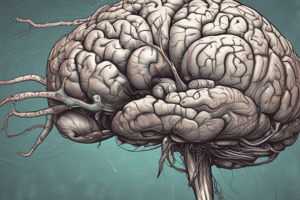Podcast
Questions and Answers
What are the three main parts of the brain stem?
What are the three main parts of the brain stem?
- Hypothalamus, thalamus, and epithalamus
- Midbrain, pons, and medulla oblongata (correct)
- Cerebrum, cerebellum, and brain stem
- Frontal lobe, parietal lobe, and temporal lobe
What function is NOT controlled by the brain stem?
What function is NOT controlled by the brain stem?
- Managing sleep and wakefulness
- Regulating body temperature
- Processing sensory information from the face and head
- Controlling voluntary movements (correct)
How many cranial nerves originate from the brain stem?
How many cranial nerves originate from the brain stem?
- 8
- 10 (correct)
- 14
- 12
What is a possible consequence of damage to the brain stem?
What is a possible consequence of damage to the brain stem?
What is an example of a disorder that can affect the brain stem?
What is an example of a disorder that can affect the brain stem?
What function is controlled by the brain stem?
What function is controlled by the brain stem?
Study Notes
Location and Structure
- The brain stem is the lower part of the brain that connects to the spinal cord
- It is divided into three main parts: midbrain, pons, and medulla oblongata
- The brain stem is responsible for controlling many of the body's automatic functions
Functions
- Regulates breathing, heart rate, and blood pressure
- Controls body temperature, hunger, and thirst
- Manages sleep and wakefulness
- Processes sensory information from the face and head
- Plays a role in regulating posture, balance, and movement
Cranial Nerves
- The brain stem is the origin of 10 of the 12 cranial nerves
- These nerves are responsible for controlling various functions such as:
- Smell and taste
- Eye movement and vision
- Hearing and balance
- Facial expressions and sensation
- Swallowing and salivation
Damage and Disorders
- Damage to the brain stem can result in serious consequences, including:
- Respiratory failure
- Coma
- Death
- Disorders affecting the brain stem include:
- Stroke
- Traumatic brain injury
- Brain tumors
- Infections such as meningitis and encephalitis
Brain Stem Structure
- Located at the base of the brain, connecting to the spinal cord
- Divided into three main parts: midbrain, pons, and medulla oblongata
Brain Stem Functions
- Regulates vital functions:
- Breathing
- Heart rate
- Blood pressure
- Controls:
- Body temperature
- Hunger
- Thirst
- Manages:
- Sleep and wakefulness
- Posture and balance
- Movement
- Processes sensory information from the face and head
Cranial Nerves
- 10 out of 12 cranial nerves originate from the brain stem
- These nerves control various functions, including:
- Smell and taste
- Eye movement and vision
- Hearing and balance
- Facial expressions and sensation
- Swallowing and salivation
Damage and Disorders
- Brain stem damage can lead to severe consequences, including:
- Respiratory failure
- Coma
- Death
- Disorders affecting the brain stem include:
- Stroke
- Traumatic brain injury
- Brain tumors
- Infections (e.g., meningitis and encephalitis)
Studying That Suits You
Use AI to generate personalized quizzes and flashcards to suit your learning preferences.
Description
Learn about the brain stem, its parts, and its roles in controlling automatic functions, regulating bodily processes, and processing sensory information.




